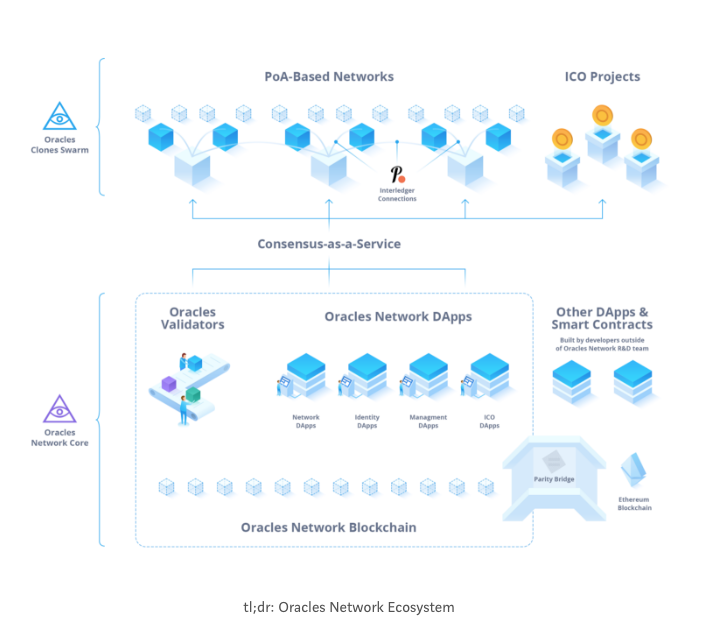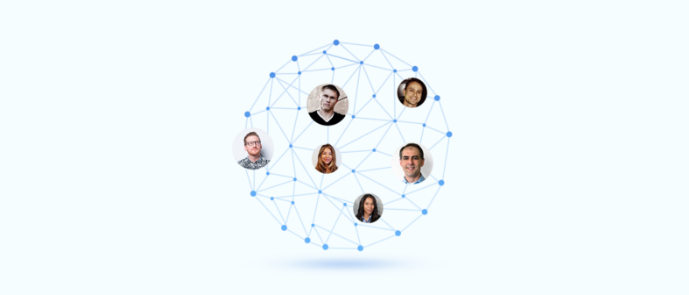Nov 11 (newsonjapan.com) - Oracles Network is an open, public, permissioned network based on Ethereum protocol with Proof of Authority (PoA) consensus, reached by independent pre-selected validators. By PoA we mean a modified Proof of Stake, with identity used as a form of stake, which incentivizes validators to act in the interest of the network.
In any project, however, what’s more important than definitions is the answer to WHY the project exists in the first place. In this post, we will describe why we are building Oracles Network and how it finds its place in the blockchain smart contracts universe.
To answer WHY, we will first zoom in and take a closer look at what’s under the hood. We will examine the parts of the structure that the Oracles Network R&D team has been developing for the last eighteen months. After that, we will zoom out to see how this inner structure enables the broader purpose.
Consensus by Individuals as Business Model for Blockchains
In the last couple years, blockchain technology has demonstrated a number of potential applications: from enabling completely new business models to simplifying our daily routines. Without a practical path to implementation, however, all innovation resembles a theoretical exercise.
It is especially true when such innovation is not directly related to consumer-facing applications, but involves protocol changes. We have witnessed the creation of multiple siloed chains that were not compatible with each other and required months before they could even launch. This made the “Not another chain!†comment a staple in community forums. The arrival of the interledger protocol brought a promise of connecting various chains to communicate and transfer value. But it did not make it simpler, cheaper, or faster to run smart contracts or to implement blockchain technology for small and medium businesses.
As a result, such businesses are left with a few options. First, they could build their services on top of existing expensive public networks. Execution of this option, from start to finish, would require the allocation of significant resources. Second, they may try to build their own private blockchains. That would give some bragging rights to the business founder, but in reality would represent a structure no different than just a database. Third, they could just keep the status quo and miss out on the blockchain’s opportunities. The bottom line is that open public blockchain networks are still out of reach to businesses with which we interact on a daily basis.
Can there be a cheaper solution that would allow small and medium businesses (SMBs) to take advantage of blockchain technology without having to divert a significant portion of their resources to it?
At Oracles Network, we are making the case that consensus by individuals is a feasible business model for blockchains. A streamlined consensus algorithm that creates a trustless environment without an expensive setup, combined with a swarm of blockchains, connected to each other to transfer value, can establish a foundation for faster and cheaper smart contracts. This will ultimately open the doors to the crypto world to many businesses. Making open networks more affordable and accessible to SMBs is the crucial step we need to make for broad blockchain adoption.

Zooming in…
Let’s first look under the hood of Oracles Network — we call it “Oracles Network Coreâ€. Oracles Network Core consists of the PoA-based protocol, the validators who seal the blocks according to the rules of this protocol, and the DApps that enable the network functionality.
Oracles Network adopts the best practices of the Ethereum protocol but, nevertheless, is an independent chain with its own native coin. Instead of current PoW or soon-to-be implemented PoS, Oracles Network uses consensus established by the reputation of verified and known individuals. A blockchain established on such protocol with consensus by private actors on public duty makes smart contract creation and execution cheaper and faster.
The idea of consensus by known individuals raises two questions: 1. How can a small group power the entire network? 2. How can a few people be ensured to act in the interests of the network?
To address the first question, we need to acknowledge a certain bias that the PoW-based consensus creates in our minds. As the most popular consensus mechanism requires a lot of computing power to function, we kind of expect that to be the case for any network. However, since the validators in the PoA network are not solving complex mathematical tasks, the computing requirements to them are pretty lightweight. There is no need for specialized equipment, aside from high-speed reliable internet connectivity.
To address the second question, consensus by a few trusted people in PoA is far from a novel concept. Take DPoS, for example, where select delegates are chosen by the stakeholders to represent them. Establishing a group of trusted parties is possible not only by having them stake their funds, but also by having them stake their identity. While the same size monetary stake has different value for different actors, depending on their overall wealth, own identity is valued by everyone pretty much the same. We believe that Identity at Stake setup can establish the incentives in such a way that the only course of action, which makes sense, would be acting in the interests of the network.
As we described before, the validators need to have their identities known and verified. We achieve that by requiring them to have an active public notary. Why public notary? Because this allows us to take advantage of the existing system providing information about a validator in the public domain. For example, you can go here and get the addresses of all the notaries in the state of California.
This serves a number of purposes. At a minimum, public notary certification means that a person has passed a test that he or she is of good morals and has no criminal record. More importantly, should things go wrong, the suffering party to a transaction knows who validated that block and has the means to go after the validator. In fact, the validators on the core Oracles Network are required to sign a legal agreement, making them liable for willful misconduct and fraud, regardless of what technology has been used in the process. The agreement formalizes on-chain governance, allowing other validators to terminate “bad guys†or fork the network if a validator or a group start acting nefariously (due to collusion or as the result of someone hijacking a good validator’s node).
Lastly, why should a user of Oracles Network in Australia even care about public notary? That certification means absolutely nothing to them. And it should not. What’s important is what that certification means to a validator, who now stakes their identity to secure the network. The fact that validators know that they are under observation and their mistakes will be visible and cost them the right to validate the network makes them act the way they are expected to act. This enables an incentives model where you don’t need to personally trust a validator, but the setup will still work and self-cure should things go wrong. A rational validator understanding that his or her information is publicly available is better off acting in the interests of the network than cheating the system.

To establish these rules, Oracles Network uses DApps that initiate the network. The Ceremony DApp allows for distribution and exchange of the keys necessary for the validation on the network. The Governance DApp establishes on-chain governance. The Validators DApp provides the information on the validators.
By using these DApps, anyone can initiate a public or a private PoA-based network with any set of validators, specific to an industry or a community. These networks will support any DApps run on Oracles Network. Similarly, the validators for Oracles Network can also secure other PoA-based networks, introducing the concept of “consensus-as-a-serviceâ€.
This kind of replicability is the foundation of the horizontal scalability concept we introduce.
Zooming out…
A chain where a few known private actors enable consensus for the benefit of the network results in a cheaper and faster platform on which to build other DApps and write smart contracts. Take an example of universities building a DApp to handle official transcripts on the Oracles Network. However, Oracles Network Core by itself is inevitably confined within its capabilities by the fact that the people who validate the network cannot be known to everyone. Even though the incentives are built in a way that validators are better off staying honest, users have a stronger affiliation to a network if they actually know the validators. The ability to replicate networks with the authorities relevant to a specific community has a potential to create a number of networks where each individual network has participants who are vested in its success while together the networks are compatible and connected.
Whether in Australia or Finland, using Oracles Network DApps, an initiator can launch a new PoA-based network by distributing the keys to the validators, authorities in that community, who might, but do not have to, include some of the validators from the Oracles Network Core. That means the model of consensus by the known individuals would be transferred into the context of a specific community. Once the blockchain is incepted, the initiator does not have any more power to change anything, and the validators act according to the governance rules. Their identities are verified and can be cross-checked in the public domain of that country or industry.

Similar nature of networks allows connectivity, seamless value transfer, and speed at which these networks can be established. With a number of “clones†serving different communities yet remaining compatible with each other, we create micro-universes, self-sustainable ecosystems, or what we call a “Clones Swarmâ€. When these chains are connected by an interledger protocol, like Cosmos or decentralized bridges, the combination of parachains creates a truly decentralized structure and can solve the blockchain scalability issues.
Before the multiple clones of Oracles Network can start appearing, however, we need to launch the Oracles Network itself. In order to make the concept of horizontal scalability practical, we cannot leave the inception of the Core Network to the remote future. Only launching the network and issuing the native coin automatically with the receipt of contributions to the crowdsale, will allow us to achieve the expedited progress to realizing the horizontal scalability goal. The faster we deliver the native coin to the hands of the contributors, the quicker the it will live up to its true utility value. And thus, our ICO will be a one-of-a-kind cross-chain token sale where funds are raised on Ethereum Mainnet and the native coins are simultaneously created on Oracles Network.
We have been enabling the community to run their own crowdsales using our automated ICO Wizard (you can read more info here). Now we will introduce a new practice that can close the gap between the fundraising and the time the campaign supporters get the native token. Oracles Network has built and tested a cross-chain bridge allowing to connect any Ethereum-compatible networks. Using it, we can create cross-chain crowdsale contracts and collect funds on the main Ethereum network while issuing tokens on another, more performant and cost-efficient Ethereum-compatible network. On a bigger scale, such bridges will allow us to seamlessly transfer value between the networks. By conducting a first cross-chain token sale ourselves, we are hoping to be trailblazers in this new practice. We envision it as a way to align the interests of all ecosystem participants and to give more confidence to the token holders, the members of the engaged community with the true desire to see it thrive.
By launching Oracles Network simultaneously with the token sale, we are laying a concrete path to realizing our vision of horizontal scalability and, ultimately, making blockchain technology more accessible to everyone.
Join us in this exciting journey:
- Oracles Network Forum — we discuss our progress updates, answer questions, reply to your feedback;
- Follow our official updates via Twitter ;
- Let’s chat on Telegram.
We welcome ideas and feedback from the community and are open to collaborations!









